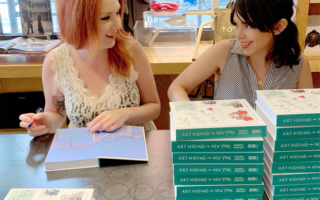Interview with Author Janet Hulstrand
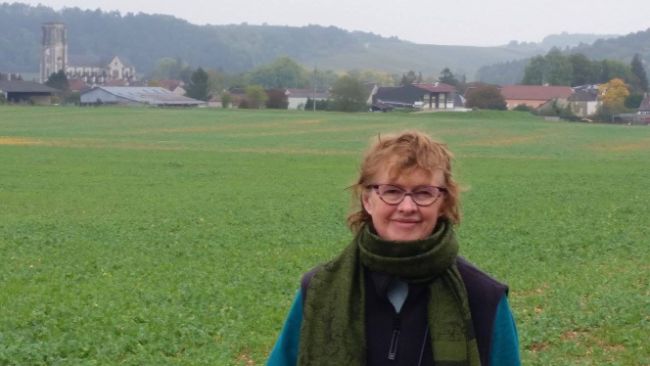
Janet Hulstrand is a writer, editor, writing coach and teacher of literature who divides her time between France and the US. She is a frequent contributor to Bonjour Paris and France Today, and the author of Demystifying the French: How to Love Them and Make Them Love You. In her new memoir, A Long Way from Iowa: From the Heartland to the Heart of France, she tells the story of how a love of reading, writing, and travel was passed down to her by her mother and grandmother, and how it fueled the direction of her own life, which took her from a childhood in Minnesota to her current life in a little village in Champagne — with stops along the way in New York, Washington DC, and Paris. Hulstrand recently answered questions from Bonjour Paris editor Mary Winston Nicklin.
What was the genesis for this book? Can you tell us a little bit about the quest that was launched when you found something that your grandmother had written in her journal in 1931?
It was just one tiny piece from her journal that I found as I was going through my mother’s papers after she died. It was such a vivid peek into my grandmother’s life as a young mother during the Depression that it made me want to read more. That little excerpt also made me realize that she had been a very talented writer. I had never thought of her in that way before. I knew she always had little notebooks that she would write in, and since my mother never threw anything away, I figured I would be able to find years of her journals somewhere. I didn’t find as much as I hoped to, but I found some other interesting pieces of her writing; and the quest did take me on quite a journey of discovery, including some trips back to my grandmother’s hometown in Iowa.
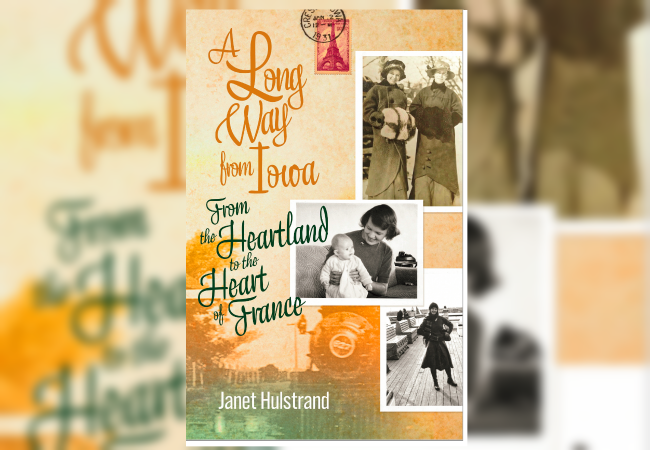
“A Long Way from Iowa: From the Heartland to the Heart of France” by Janet Hulstrand
You say that you didn’t actually like this grandmother very much when you were growing up. Can you say more about that?
Well I had figured out at about the age of ten, that she didn’t really like me, and the only thing a ten-year-old can do about that is to not like someone back. At least that is the only thing the ten-year-old child who was me felt she could do.
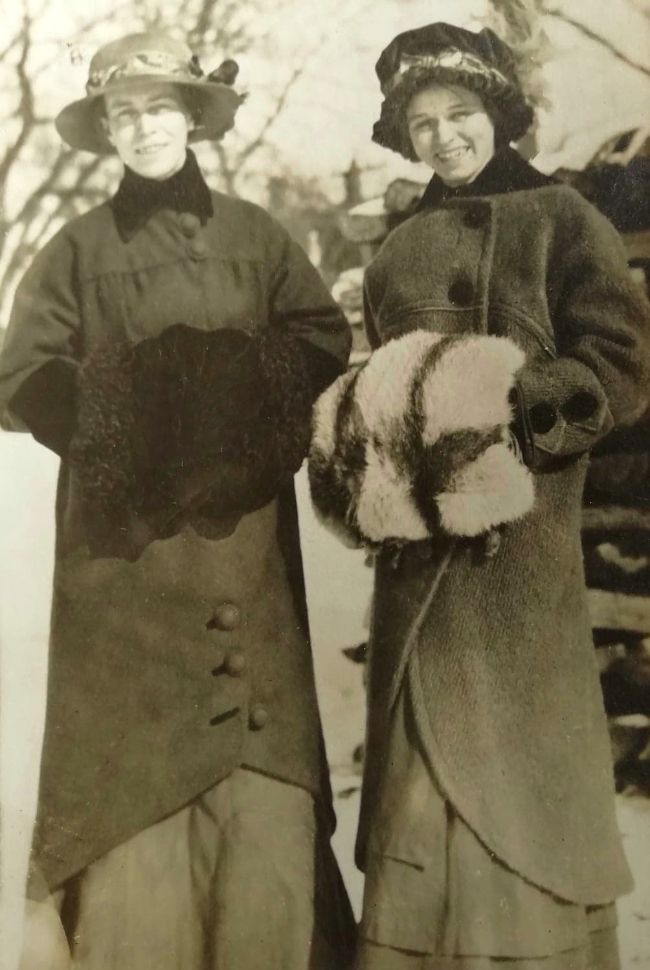
Ini & Effie Sanborn c.1918, courtesy of Janet Hulstrand
How did your opinions change about your mother— whom you had considered “just a nurse and mom” when you were younger— as you learned more about her?
Sadly, my opinions about my mother changed substantially right after she died. I was never able to really stop defining myself, in a way, in opposition to her until then. Then as soon as she was gone I was able to see just how fundamental her character, her sensibility had been in forming my own — and how that was not such a bad thing. It’s too bad I couldn’t have expressed the admiration I now feel for her more while she was still alive. But she was very wise. I think she probably knew that underneath all my rebellion there was a deep love for her. And though we often clashed, our connection was strong.
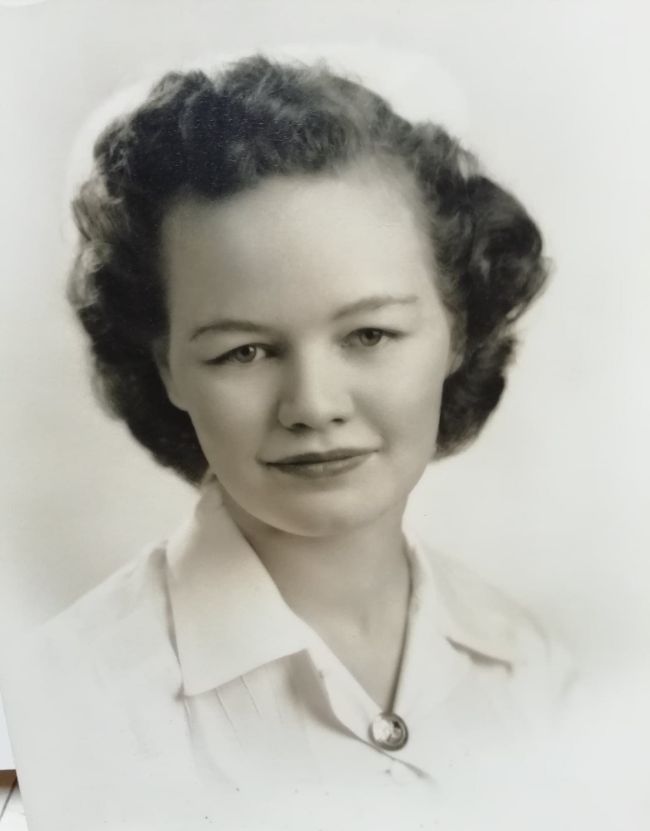
Carolyn Powers, courtesy of Janet Hulstrand
One of the major themes in your book is motherhood, from your grandmother’s difficulties during the Depression and your mother’s sometimes conflictual relationship with you, to your own life as a mother. Can you comment on this and on how motherhood has shaped your own life and work?
Both my mother and grandmother put family first, and I like to think I have done so also, though at times it has been difficult to juggle the multiple roles I’ve had. But being a mother has been by far the most important work in my life. Yes, I suppose it slowed me down a bit in terms of my writing career (though I have never really thought of my writing as a career, much more as a passion). Being a mom is the main reason why it took me so long to write this book, for one thing! But I don’t regret it one little bit. I was lucky to be able to work part-time, from home, when my children were young. This meant that I was able to be at all those school parties and other special events. I wouldn’t have missed any of that for the world. I wish we could arrange things so that many more moms (and dads) could have the same privilege. I don’t see why it couldn’t be. It would just take more flexibility in the workplace. Would that be such a bad thing?
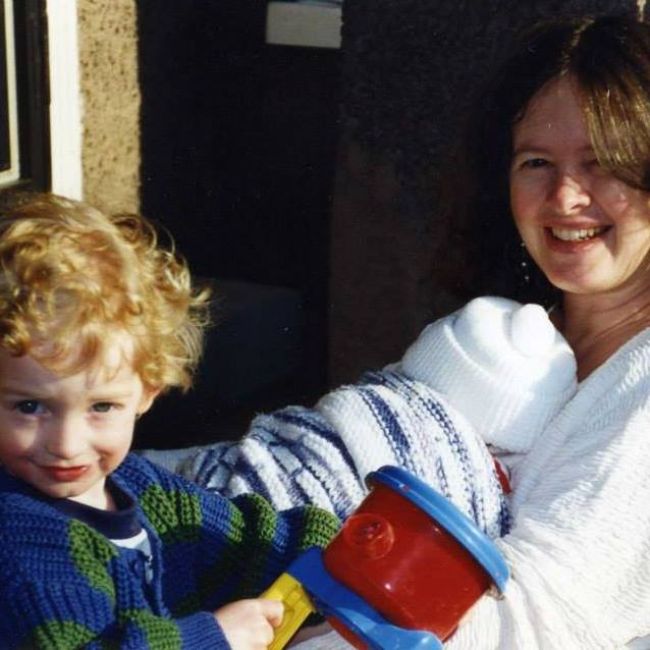
Janet Hulstrand with her sons in Brooklyn, 1996. courtesy of Janet Hulstrand
There’s also a love of travel that has been transferred between the generations in your family.
Yes. Both my mother and my grandmother loved to travel and did quite a bit of it—for the times, and for their social class—before they were married. These travels were mostly by bus and train, across parts of the western United States. My mother was able to travel much more widely also in the last few years of her life, making it all the way to China and the Middle East. But neither of them got to immerse themselves for long periods of time in a faraway place, the way I’ve been fortunate to be able to do in France.
I see abundant optimism in your book. In speaking of your own Midwestern family’s “deferment of a specific dream” and its ultimate fulfillment in your own writing career, you also touch on the progress for American women in the last century. Can you say more about this?
Yes. I did say that I think things have opened up over the past century in a way that has made it easier for women to follow their dreams, and fulfill their potential. And I meant it. But I must say that as I observe some of the recent changes in the political landscape in the US, I worry a bit that for many women things are going backward again. That is not a very optimistic sentiment, but I think the issue is real, and something we should all be concerned about.
Can you tell us a little about your own writing process and routine? Are you working on any literary projects now?
I don’t really have a routine. I am “writing” much of the time, actually, either in my head or on paper and there’s no regularity to the schedule of when I actually sit down and start typing. I started thinking about A Long Way from Iowa and wrote the first words of it thirty years ago! But for many years I wasn’t able to do much about it as I was focused mainly on raising my two sons, and on bringing in what income I could through freelance work. I do have a vague idea about the next book I’d like to write, another memoir. There’s a lot of story that didn’t fit into the arc of the three-generations-of-women storyline of this book. I’ve started jotting down scattered memories and thoughts that I don’t want to lose track of, and composing a bit. But I’m not sure yet what shape the next book will take. I do know that I probably won’t have thirty years to work on it—so I’ll have to work a bit faster this time!
There’s a quote by Yo-Yo Ma in your epilogue, which I think encapsulates your entire memoir. Can you tell us a little bit about that quote, and its universality?
The quote is “It takes the wealth of three generations to make a musician: the first to work the fields, the second to go to school, and the third to master an instrument.” A friend told me about it when I was telling her about my book. I think it certainly encapsulates something that is true not only for me but for many people: that we stand on the shoulders of our ancestors, and that some of the things that are not achievable in one generation may be achievable in the next. I can see that my two sons—one a journalist, the other a singer/songwriter—are probably going to take their writing careers much farther than I’m likely to take mine. That is fine with me. It is a source of deep joy in fact.
You have strong Swedish-American roots. Can you talk about how you ended up in France and not Scandinavia? On a related note, one of the delightful anecdotes I enjoyed was finding out that your Uncle Lewey served in France during the Second World War. So there is an intergenerational connection to France….
My Uncle George (who was on the Swedish side of my family) would have liked to know the same thing. In fact he even asked me once, after I had been going to France every year and staying for as long as I could, what would make “a girl from Minnesota” (read Swedish) “want to go to France all the time like that.” I do hope to finally get to Sweden this year with my sons!
It’s true there is an intergenerational connection to France on the other side of my family, with my Uncle Lewey. But I didn’t know about his wartime service until after I had returned from my first trip to France. So it wasn’t that that drew me there. It was the language, the beautiful beautiful French language.
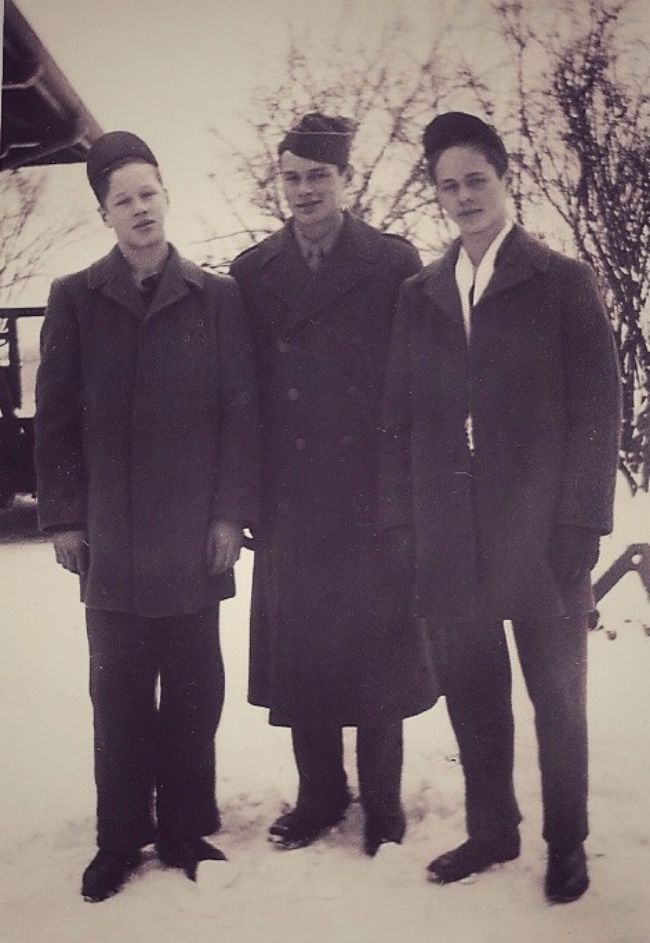
Lewis Powers Home From War, courtesy of Janet Hulstrand
What are you reading now?
I am usually reading (or rereading) something about, or set in France, because that is just my passion in life. And I share that passion with others through teaching classes, mostly classes featuring books about France. However, I’m looking forward to rereading three wonderful memoirs set in the Midwest over the next few weeks, in preparation for an online class I’ll be teaching for Politics and Prose bookstore in April. They are: Leaning into the Wind by Susan Allen Toth; Heartland by Sarah Smarsh; and Packinghouse Daughter by Cheri Register.
Lastly, we are so thrilled about the launch of the Bonjour Paris Book Club, which you will be hosting. Can you tell us a bit about how you chose the books and what you hope our readers will get out of it?
I’m thrilled too! For the first season of the book club I chose one book by Hemingway (A Moveable Feast) and one very fine work of historical fiction written from the point of view of his first wife, Hadley Richardson (The Paris Wife). And I chose two collections of essays about Paris: David Downie’s Paris Paris: Journey into the City of Light, and Penelope Rowlands’s specially curated collection of essays by 32 different writers, called Paris Was Ours. My hope is that between these four books we’ll get a great overview of Paris from the 1920s to the (almost) present. And I hope with a mix of fiction and nonfiction, essays and novels, we’ll draw readers with a broad range of interests, but with one thing in common: a love of Paris!
You can purchase A Long Way from Iowa: From the Heartland to the Heart of France through BookBaby, Bookshop.org, and other online sources. If you’re in Paris, orders can be placed at the Red Wheelbarrow Bookstore.
Lead photo credit : Janet Hulstrand in Essoyes, 2015. Photo by Kevin Sisson
More in author, author interviews, book club, books, Interview, Janet Hulstrand


